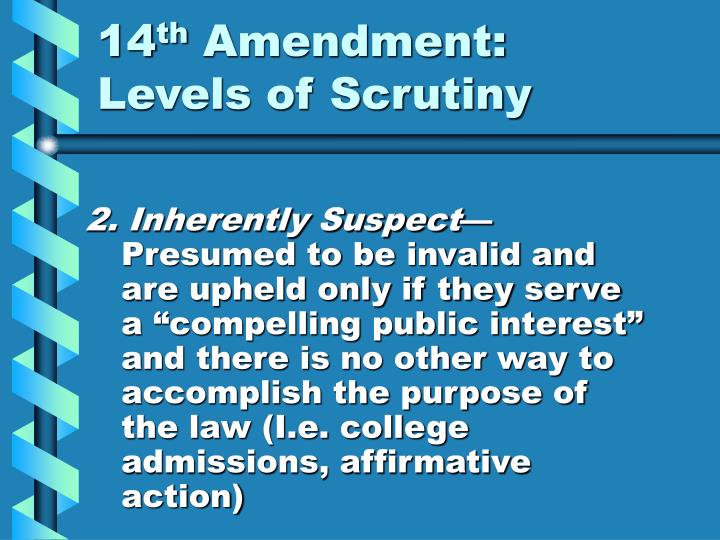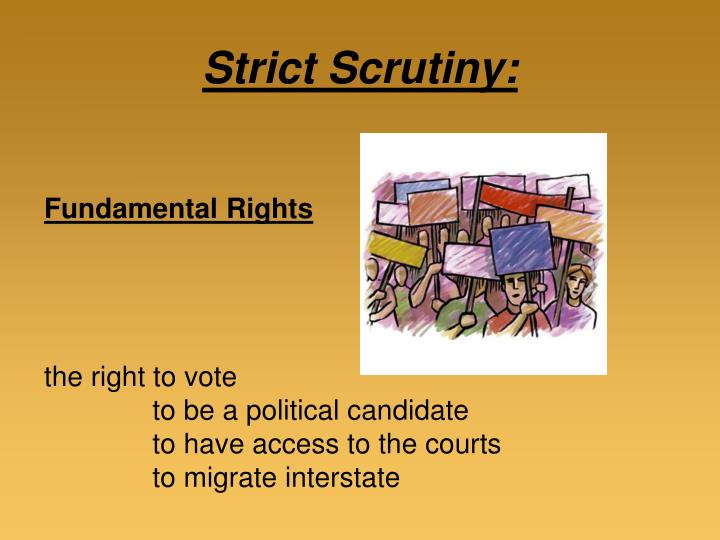
2d 437 (1981), the Court upheld a STATUTORY RAPE law that set different ages of consent for females and males.

Nevertheless, the Court has upheld laws that apply sex-based distinctions. 2d 267 ), and pensions ( Arizona Governing Committee v. 2d 306 ), sexbased mortality tables ( City of Los Angeles Department of Water and Power v. It has established the right of equality in laws dealing with survivors' benefits ( Weinberger v. The Supreme Court has sustained numerous challenges to gender-based discrimination, thereby mandating equal rights under the law. 2d 397 (1976), "classifications by gender must serve important governmental objectives and must be substantially related to achievement of those objectives." Thus, intermediate scrutiny lies between strict scrutiny and rational basis. Instead, the Court developed the intermediate or heightened scrutiny test. The Supreme Court has refused to make sex a suspect classification, but it did not impose the rational basis test on matters involving sex discrimination. Under strict scrutiny, the government has a difficult burden to meet, while under rational basis, most laws will be upheld. If a suspect classification is not involved, the Court will apply the RATIONAL BASIS TEST, which requires the state to provide any reasonable ground for the legislation. Strict scrutiny forces the state to provide a compelling state interest for the challenged law and demonstrate that the law has been narrowly tailored to achieve its purpose. Women's rights supporters sought to have the Court include sex as a "suspect classification." The SUSPECT CLASSIFICATION doctrine holds that laws classifying people according to race, ethnicity, and religion are inherently suspect and are subject to the STRICT SCRUTINY test of JUDICIAL REVIEW. 2d 225, extended the application of the Equal Protection Clause of the Fourteenth Amendment to gender-based discrimination. I trust him and I decide that A knows that this particular kind of mushroom is not poisonous.In 1971, the Supreme Court, in Reed v. He asserts that it is very popular in the nearby villages, and that he eats them every spring. He seems to be a reliable person and he tells me in a completely serious way that this particular kind of mushroom is not poisonous. I am lucky again and a villager (call him A ) appears.

I know the main kinds of mushrooms but I have doubts about the particular kind I have found today. I am very lucky and I find plenty of them in a meadow.

Consider the following case: (I) It is a sunny spring day and I have decided to go to the country and to look for mushrooms. Therefore, my comments will be directed to Fogelinâs arguments rather than to Lewisâ. But, although I agree with Fogelinâs general outlook, I think-probably wrongly-that his position endorses one form or another of contextualism. Valdbs-Villanueva I am rather sympathetic to Fogelinâs criticism of David Lewisâ paper âElusive Knowledgeâ. If I consider that procedure CONTEXTUALISM AND LEVELSOF SCRUTINYĬontextualism and Levels of Scrutiny Luis M. I trust him and I decide that A knows that this particular kind of mushroom is not poisonous.

Contextualism and Levels of Scrutiny Contextualism and Levels of ScrutinyĬontextualism and Levels of Scrutiny Luis M.


 0 kommentar(er)
0 kommentar(er)
